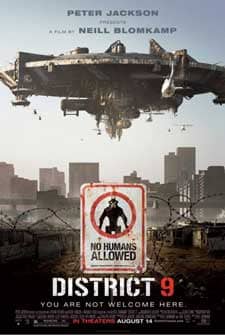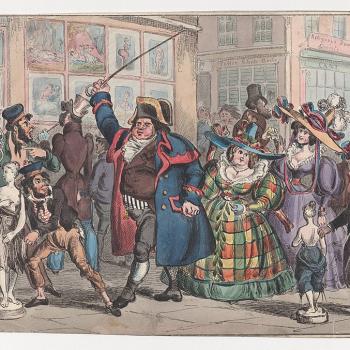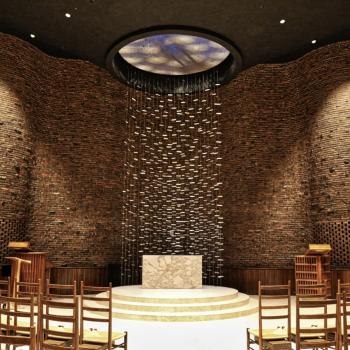Children of Men (2006)
Children of Men's vision of a post- or near-apocalyptic dystopia "appeals" even more to me as a more accurate, and hauntingly prophetic, vision of what our world is in danger of becoming. In the not-so-distant future, humans are incapable of reproducing; however, when one young woman becomes pregnant, it results in a battle over who will control her and her child. What's also interesting and compelling about Children of Men is its notion of salvation that necessitates peace but requires some form of violence. There is a complexity here that mirrors much of our real, lived experience, believing in the notion of peace, but recognizing that it is often a hard, violent road we take to get to it. As such, it is not a problem-free film and issues of race and accompanying power are prevalent. Seeds of the Jesus narrative and liberation theology are present here as well with the source of humanity's future (salvation?) coming from the margins of society.
For the Bible Tells Me So (2007)
Few topics have, rightly or wrongly, defined American Christianity in the past decade like gay rights, gay ordination, and marriage equality. Unfortunately, it appears that these controversies are not fading away anytime soon. Taking a cue from Philip Clayton and Tripp Fuller's Transforming Theology, perhaps we need to find a new way to talk about our differences of opinion. One could argue that film provides a wonderful conversation starter and an embodied means of communication. In his documentary, For the Bible Tells Me So, Daniel Karslake definitely has an agenda, to reveal the hypocrisy of conservative, evangelicals' belief in Biblical inerrancy and the hatred for homosexuals that it fuels. However, he balances this agenda by focusing his film on five families who, at different points in their life, had decidedly opposite agendas. Karslake examines families who were all staunchly opposed to homosexuality quite simply because the Bible told them so. However, each family had this faith shaken by a child who announced his or her homosexuality. Far from presenting monolithic responses in any direction, Karslake reveals a variety of reactions from a mother who rejected her daughter outright to parents that soon became champions for civil rights for gays and lesbians. While Karslake's documentaryshould not be seen as the last word in this discussion, it should be the first.
District 9 (2009)
 This might be the one film that most readers would disagree with being on the list or at least wonder why in the world it is here. From a filmmaking standpoint, it returned science fiction films to the low-budget arenas that they once occupied, eking out stunning visuals with relatively little resources while employing them to enhance the narrative and character development. From a spiritual or theological approach, it stands head and shoulders above its sci-fi peers, making it one of the best films of that genre of the decade. District 9 takes place in Johannesburg, South Africa, where 20 years ago an alien space ship arrived and hovered over the city. It did nothing...just floated there. Finally, a team of soldiers, scientists, and government officials infiltrated the spaceship to find hordes of malnourished aliens. In order to "help" them, they moved them to a shanty-town area of the city named District 9. There, the aliens reproduced but lived in ever-devolving situations scrounging for food in the trash, trading their weapons to Nigerian gangs for cat food, and even engaging in creature-to-creature prostitution. Fed up with the horrific conditions and situation, the people of Johannesburg demand that the aliens be moved further away from the city. Officials set up a refugee camp 200 km away and begin the process of forced evacuation/eviction. In this process, the director of the program Wikus Van De Merwe (first-time actor Sharlto Copley) is poisoned by an alien fluid which alters the entire process and his life. Two theological themes emerge when watching this film: 1) David Chidester's notion of religion as that which informs how we relate to the superhuman and subhuman and 2) liberation theology and the necessity of our own transformation as we seek to transform society.
This might be the one film that most readers would disagree with being on the list or at least wonder why in the world it is here. From a filmmaking standpoint, it returned science fiction films to the low-budget arenas that they once occupied, eking out stunning visuals with relatively little resources while employing them to enhance the narrative and character development. From a spiritual or theological approach, it stands head and shoulders above its sci-fi peers, making it one of the best films of that genre of the decade. District 9 takes place in Johannesburg, South Africa, where 20 years ago an alien space ship arrived and hovered over the city. It did nothing...just floated there. Finally, a team of soldiers, scientists, and government officials infiltrated the spaceship to find hordes of malnourished aliens. In order to "help" them, they moved them to a shanty-town area of the city named District 9. There, the aliens reproduced but lived in ever-devolving situations scrounging for food in the trash, trading their weapons to Nigerian gangs for cat food, and even engaging in creature-to-creature prostitution. Fed up with the horrific conditions and situation, the people of Johannesburg demand that the aliens be moved further away from the city. Officials set up a refugee camp 200 km away and begin the process of forced evacuation/eviction. In this process, the director of the program Wikus Van De Merwe (first-time actor Sharlto Copley) is poisoned by an alien fluid which alters the entire process and his life. Two theological themes emerge when watching this film: 1) David Chidester's notion of religion as that which informs how we relate to the superhuman and subhuman and 2) liberation theology and the necessity of our own transformation as we seek to transform society.
For longer critiques on the films above, visit the original article at www.poptheology.com.
J. Ryan Parker is the creator and editor of and main contributor to Pop Theology (www.poptheology.com). A fourth-year PhD student in Religion and the Arts (with a focus on film) at the Graduate Theological Union in Berkeley, California, his research interests include contemporary religious cinema after The Passion of the Christ, the history of religious cinema, and the ways in which films affect, and are affected by, religious consciousness. He has also served as a media consultant on documentary film projects. He holds a BA in English from Mississippi College and an MDiv from Wake Forest University Divinity School.
Richard Lindsay is an unlikely savant from the wilds of Kentucky (but the northern part near Cincinnati). He is a graduate of the University of Louisville and Yale Divinity School. He is currently a fourth-year PhD student in Religion and the Arts at the Graduate Theological Union in Berkeley, California, pursuing interests in religion, popular culture, film, and cultural theology.




